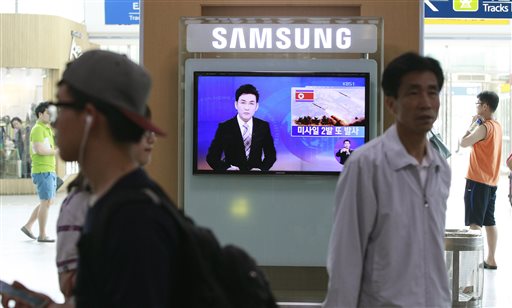
A TV news program reports on missiles launched by North Korea at Seoul Railway Station in Seoul, South Korea, Sunday, July 13, 2014. AP FILE PHOTO
Seoul, South Korea — South Korea on Monday proposed high-level talks with rival North Korea next week to discuss resuming reunions of Korean War-divided families, a proposal that could lead to the easing of tensions after months of North Korean missile tests and heated rhetoric from both countries.
The South Korean Unification Ministry said in a statement that it suggested meeting Aug. 19 on the North Korean side of the truce border village of Panmunjom. There was no immediate response from Pyongyang.
The ministry said it hoped to focus on possible family reunions over Chuseok, a major holiday celebrated in both countries that falls on Sept. 8. It also wants to discuss other issues of “mutual interest,” but a ministry official, who would speak only on condition of anonymity, citing department rules, couldn’t elaborate.
The Koreas last had a high-level meeting in February. Since then, North Korea has conducted an unusually large number of missile and artillery tests. Pyongyang also has insulted South Korea’s leader, calling her a prostitute, and expressed fury over U.S.-South Korean military drills.
The latest round of annual joint drills between the allies is set to take place in the next week or so, though officials have not released an exact starting date. North Korea’s official news agency has called the upcoming drills “extremely reckless and dangerous war maneuvers” and threatened regular “counter actions.” Washington and Seoul say the drills are routine and defensive in nature.
The most recent family reunions were held over six days in February, and were the first such meetings in more than three years. South Korean analysts say authoritarian North Korea allows only infrequent reunions for fear of losing an important bargaining chip in efforts to win badly needed aid and concessions.
The Korean Peninsula is technically in a state of war because the Korean War ended in 1953 with an armistice, not a peace treaty. Millions of families were separated by that conflict. The Koreas are now divided by the world’s most heavily fortified border.
Both sides bar ordinary citizens from visiting each other and even exchanging phone calls, letters and emails.
RELATED STORIES
Palestinians to quit Gaza talks if Israel no-show
North Korea to publish ‘rosy’ human rights report
S. Korea: Catholicism’s unlikely Asian pillar